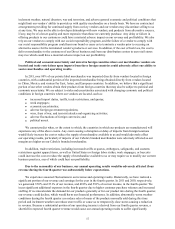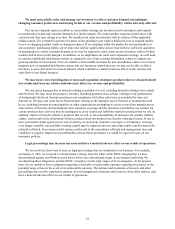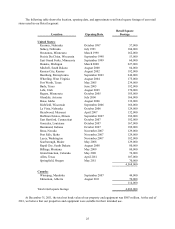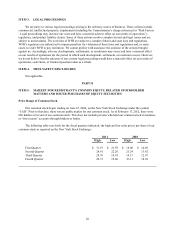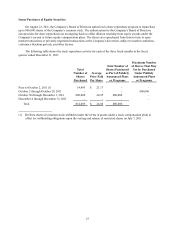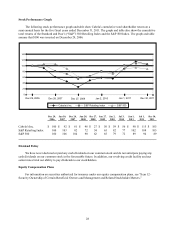Cabela's 2011 Annual Report Download - page 32
Download and view the complete annual report
Please find page 32 of the 2011 Cabela's annual report below. You can navigate through the pages in the report by either clicking on the pages listed below, or by using the keyword search tool below to find specific information within the annual report.22
• liquidity and funding risk relating to our ability to create the liquidity necessary to extend credit to
our cardholders and provide the capital necessary to meet the requirements of government regulators
and Visa;
• operational risk related to our ability to acquire the necessary operational and organizational
infrastructure, manage expenses as we expand, and recruit management and operations personnel with
the experience to run an increasingly complex and highly-regulated business; and
• the credit card industry is highly competitive with increased use of advertising, target marketing, reward
programs, and pricing competition in interest rates and cardholder fees as both traditional and new credit
card issuers seek to expand or to enter the market and compete for customers.
Economic downturns and social and other factors could cause our credit card charge-offs and
delinquencies to increase, or credit card balances to decrease, which would decrease our profitability.
The general economic environment may worsen, unemployment may continue to remain high, the housing
market may continue to be depressed, and consumer credit availability may decrease. The ability and willingness
of cardholders to pay could be adversely affected, which would increase delinquencies and charge-offs. In addition,
if economic conditions deteriorate, the number of transactions and average purchase amount of transactions on the
credit card accounts may be reduced, which would reduce the revenue of our Financial Services business. A variety
of social and other factors also may cause changes in credit card use, payment patterns, and the rate of defaults by
cardholders. These social factors include changes in consumer confidence levels, the public’s perception of the use
of credit cards, changing attitudes about incurring debt, and the stigma of personal bankruptcy. Our underwriting
criteria and portfolio management, product design, and collection operations may be insufficient to protect the
growth and profitability of our Financial Services business during a sustained period of economic downturn
or recession or a material shift in social attitudes, and may be insufficient to protect against these additional
negative factors.
The performance of our Financial Services business may be negatively affected by the performance of
our merchandising businesses.
Negative developments in our Retail and Direct businesses could affect our ability to grow or maintain our
Financial Services business. We believe our ability to maintain cardholders and attract new cardholders is highly
correlated with customer loyalty to our merchandising businesses and to the strength of the Cabela’s brand. In
addition, transactions on cardholder accounts produce loyalty points which the cardholder may apply to future
purchases from us. Adverse changes in the desirability of products we sell, negative trends in retail customer
service and satisfaction, or the termination or modification of the loyalty program could have a negative impact on
WFB’s ability to grow its account base.
Our Financial Services business faces the risk of a complex and changing regulatory and legal
environment.
Our Financial Services business operates in a heavily regulated industry and is therefore subject to a wide
array of banking and consumer lending laws and regulations. Failure to comply with banking and consumer
lending laws and regulations could result in financial, structural, and operational penalties being imposed. In
addition, as a Visa member bank, WFB must comply with rules and regulations imposed by Visa. For example,
WFB and Cabela’s could be fined by Visa for failing to comply with Visa’s data security standards.
The Dodd-Frank Wall Street Reform and Consumer Protection Act may impact the practices of our
Financial Services business and could have a material adverse effect on our results of operations.
In July 2010, the Reform Act was signed into law. The Reform Act, as well as other legislative and regulatory
changes, could have a significant impact on us by, for example, requiring WFB to change its business practices,
imposing additional costs on WFB, limiting fees WFB can charge for services, impacting the value of WFB and
its assets, or otherwise adversely affecting WFB’s business. A description of the Reform Act and other legislative
and regulatory developments is contained in “Management’s Discussion and Analysis of Financial Condition and
Results of Operations - Developments in Legislation and Regulation.”







